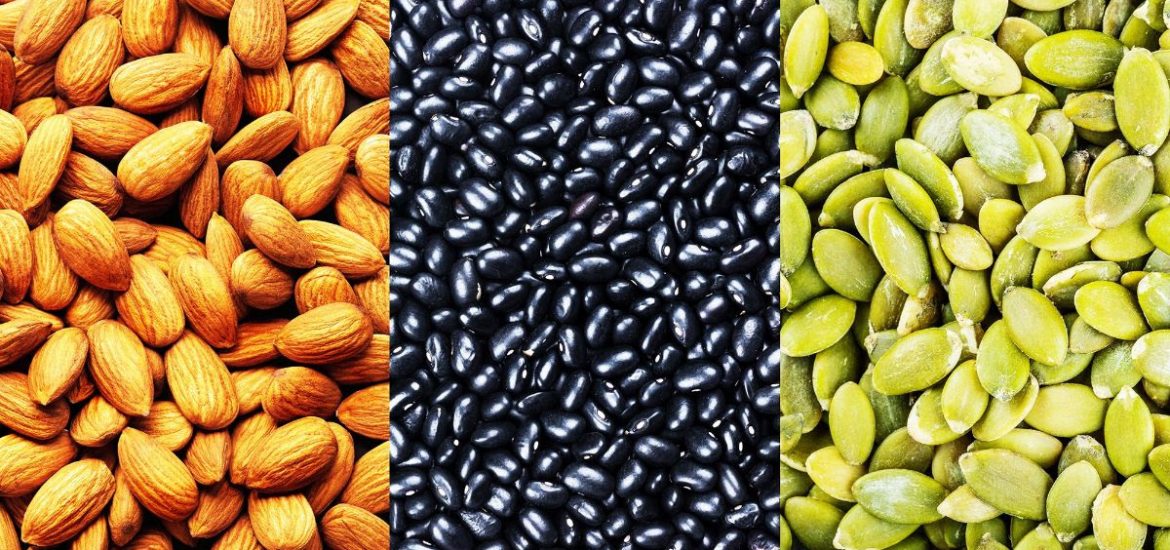If you’re trying to lose weight or to eat healthy, chicken breasts and egg whites may be your go-to for lean protein — but that gets old fast. Incorporating newer plant-based sources will keep you from getting bored, while also reducing risk factors for heart disease and cancer.
Adults in the U.S. are recommended to get anywhere from 10 to 35 percent of their total caloric intake every day from protein. For women, this means about 46 grams of protein a day; for men it adds up to around 56 grams of protein daily.
I recommend staying closer to the 35 percent and suggest including plant protein throughout the day (almonds at snack time, for example) and preferably for one meal a day (beans instead of beef!).
Here are five go-to plant based options:
1. Black beans: 1/2 cup = 8 grams
Black beans provide you with protein, but they’re also a good source of fiber (which can can help lower LDL cholesterol, aid in digestion and reduce constipation) and antioxidants (that combat free radical damage). They also contribute to satiety, preventing you from helping yourself to thirds.
Craving decadent brownies, but don’t want to derail your weight-loss efforts? Black beans can be used as a substitute for white flour for a protein-rich twist on a classic. Use coconut oil instead of butter, and top them with walnuts to make your next indulgence a little more beneficial in the nutrient department. Other legumes contribute to your satiety, too — a half cup of lentils provides almost 9 grams of protein.
2. Hemp seeds: 1 ounce = 10 grams
These little seeds contain omega-3 fatty acids famous for fighting inflammation and promoting a healthy heart. They’re also one of the handful of plant-based proteins that are considered to be a complete protein. Hemp seeds are also loaded with the key minerals potassium, iron and calcium necessary for overall health.
Sprinkle these tiny seeds onto just about anything! Add to the top of your smoothie, sprinkle over a salad, or add to oatmeal and top with cinnamon and pomegranate seeds. Already incorporate hemp seeds into your diet? Add protein to your oatmeal or smoothies with chia seeds. Just 1 ounce provides almost 5 grams.
3. Almonds: 1 ounce = 6 grams
Nuts are a great source of protein and almonds in particular are full of the good stuff like antioxidants, fiber, vitamin E, magnesium and potassium. These nutritious eats are tasty and a treat, perfect for a satiating grab-and-go snack.
Use crushed almonds to top roasted veggies (which by the way contain protein too) or add to your starchy side such as wild rice or quinoa. Not a fan of almonds? Other nuts provide protein, too — cashews have 5 grams.
4. Pumpkin seeds: 1 ounce = 5 grams
The phytosterols in these oval-shaped seeds may reduce blood cholesterol and lower your risk of certain types of cancer. They’re easy to add to a salad or yogurt for an extra dose of protein.
Or you can try your hand at making your own pesto with fresh basil, cilantro, lemon, garlic and extra virgin olive oil. Add these seeds before blending for a serious protein (and flavor!) boost. And don’t discriminate against other seeds. One ounce of sunflower seeds provides a whopping six grams of protein.
5. Edamame (soybeans): 1 cup = 17 grams
Edamame are loaded with protein, fiber and vitamins and minerals and also contains isoflavones (estrogen-like compounds) that may help prevent certain cancers.
Steam them and eat them straight out of the pod, or add them to a salad. Steam them and toss them in a snack bag with sea salt and a pinch of cayenne pepper for a spicy, metabolism boosting midday snack that definitely beats those vending machine pretzels. Not a fan of soy? Similar in texture and shape, fava beans provide an impressive 17 grams of protein per cup.
reshared from today.com

